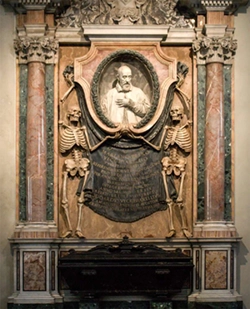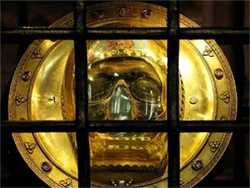Relics
A relic is an object or article of religious significance from the past. It usually consists of the physical remains or personal effects of a notable person preserved for the purpose of veneration as a memorial. Relics are an important aspect of some forms of Buddhism, Christianity, Islam and many other religions.

The practice of venerating relics seems to have been taken for granted by writers like Augustine. Thomas Aquinas pointed out that it was natural that people should treasure what is associated with the dead, much like the personal effects of a relative.
The Second Council of Nicaea in 787 drew on the teaching of St. John Damascene that homage or respect is not really paid to an inanimate object, but to the holy person. The veneration of such a holy person is itself an honor paid to God. The Council decreed that every altar should contain a relic, which remains the norm to the present day in Catholic and Orthodox churches.
Great caution is called for here, however! Although relics may help individuals feel clearer connection to the memory of historical figures, they must never be allowed to become iconic subjects of worship, as this would be a rank form of idolatry.
Many relics around the globe have little or no provenance to support the claims made about them, and indeed, some supposed relics exist in multiple places, (e.g. the head of John the Baptist), rendering their authenticity moot. Some relics, however, have withstood considerable scrutiny from both scientists and historians, making their associated stories more compelling.
We have chosen to highlight a few relics in this section because they have sparked the interest of many Christians and have not, as yet, been proven forgeries. The authenticity and importance of such objects is not something on which we take a position, but we instead leave the reader to form his or her own opinion.
Head of John the Baptist

According to different traditions, no fewer than four locations lay claim to the murdered saint’s head. In Damascus, Syria, the Umayyad Mosque was built in the eighth century A.D. on the site of a Christian church named for John the Baptist; his head is said to be buried in a shrine there. A skull identified as the head of John the Baptist is on display at the Church of San Silvestro in Capite in Rome, built to house artifacts from the Roman catacombs. The 13th-century cathedral in Amiens, France was built specifically to house the head of John the Baptist, which a Crusader supposedly brought back from Constantinople in 1206. And in Munich, Germany, the Residenz Museum includes John’s skull among a number of relics collected by Duke Wilhelm V of Bavaria with the Pope’s permission in the mid-16th century.
Wikis About Others
Holy Chalice (Grail) Image of Edessa True Cross Veil of Veronica

